Don’t call them amateurs
FLW Tour co-anglers continue to parlay on-the-water experiences with pros into learning opportunities, long careers
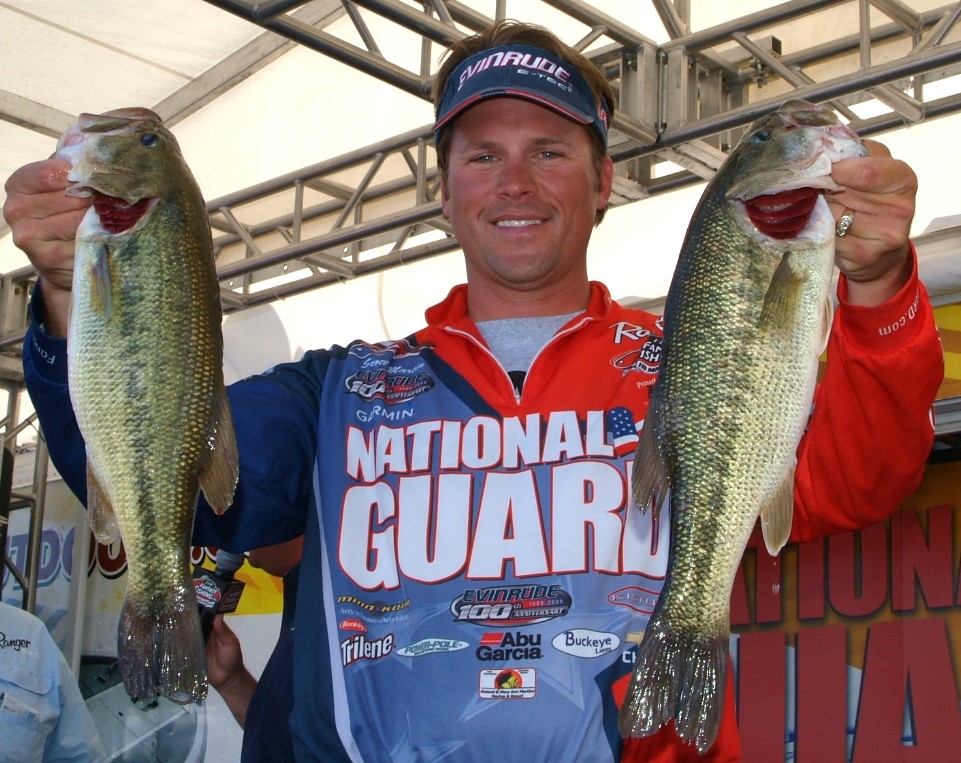
While most fans will never get a chance to play with Michael Jordan, race with Jimmie Johnson or share a tee time with Tiger Woods, on the Walmart FLW Tour weekend warriors continue to have the opportunity to rub shoulders with some of the greatest anglers in the history of the sport.
As an FLW Tour co-angler, the opportunity to fish with the leaders and legends – Larry Nixon, Bryan Thrift, Andy Morgan, Brent Ehrler and Luke Clausen – is virtually an unparalleled experience.
According to former co-angler Justin Lucas, now a successful FLW Tour pro, the knowledge gleaned from observing a rotating list of top-notch bass pros is more than worth the cost of entry.
“It’s one thing to go fishing with a pro on a regular day or as a guide, but when you’re with them on a tournament day, and you’re watching them think and you’re watching the moves they make … that’s something you can’t pay for anywhere else,” Lucas said.
“I’d recommend the Tour over anything else if you want to learn,” said co-angler Brandon Hunter of Benton, Ky. “What better way to learn than to learn from the best?”
Pressure points
In addition to fishing with some of the all-time greats, another distinct advantage of fishing as a co-angler on the FLW Tour is the peace of mind of not having to fish for a living. Hence, co-anglers can jump into a boat with a legendary pro and simply soak in the information, not sweat every single cast.
Todd Lee, a two-time Forrest Wood Cup co-angler winner, said, “There’s no pressure as far as being a co-angler. You show up, and all the pros are good fishermen. I still lose fish and I still get upset when I miss an opportunity, but I don’t make a living doing it, so I don’t have pressure in that regard.”
Indeed, for many co-anglers, fishing tournaments can take on the luxury of being more of a hobby instead of a steady source of income, unlike the vast majority of bass pros.
“I’m just somebody who likes to fish,” Lee said. “When you talk about the Clark Wendlandts, the Jay Yelases, the Tom Manns … they are great bass fishermen. I’m just fairly decent. I don’t have the desire to do it professionally. I enjoy going to the different lakes and the great fisheries and getting to hang out with my buddies. And if I do well, I get to take a check back home.”
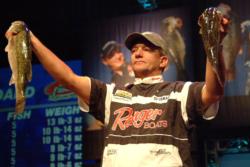 Co-angler Frank Divis Sr., who has earned close to a quarter of a million dollars from the back of the boat, wisely notes that a co-angler under pressure is an underperforming co-angler.
Co-angler Frank Divis Sr., who has earned close to a quarter of a million dollars from the back of the boat, wisely notes that a co-angler under pressure is an underperforming co-angler.
“There’s nothing wrong with fishing in the back of the boat with aspirations,” Divis said. “You just can’t concentrate on that, though. The biggest mistake for a co-angler is to go in saying, `I’ve got to make enough money to break even.’ Then you’re fishing under pressure. You need to go in with an open mind.”
Some anglers, like Lee, harbor no pro aspirations, but some do. Scott Martin was the 1999 FLW Tour Co-angler of the Year and has since become one of the most well-known pros in the sport with three Tour wins to his credit. For Martin, the season spent as a co-angler relieved pressure in a different way.
“I couldn’t imagine traveling to my first event as a pro – going off to a strange lake with all that pressure,” he said. “Being a co-angler allowed me to get comfortable with that for a year.”
Fishing University
There is perhaps no better way to learn how to compete as a bass angler than by fishing as a co-angler. The information learned from what the pros have to say or even just by observation is priceless.
“I learned as much from people who made bad decisions as those who made good decisions,” Martin said.
“I’ve learned so much out of the back of the boat,” Divis said. “When people tell you they’ve learned enough, they’re wrong, because you can never learn enough. I learn something every day I go out.”
“Every bit of fishing knowledge I have, I learned from those guys,” Lee said of his pro partners. “I can’t tell you what a novice I was in ’96 when the Tour started, and now there is no technique or way to catch fish that I have not seen up close and personal from the best fishermen in the world.”
For Hunter, the most valuable skill he has learned from the back of the boat is versatility.
“You go from lake to lake, and as a co-angler, every day you may be doing something different,” he said. “Since you’re limited in your tackle, the biggest advantage to being a co-angler is learning how to be versatile. It’s not always up to you as far as what you’re going to be doing.”
Learning the virtues of patience as well as mastering the art of pro/co-angler etiquette has been the key lesson for Divis.
“Some guys want to match the guy in the front cast for cast, fish for fish, and that’s not going to happen,” Divis said. “As a good co-angler you just have to accept that and bide your time. You’ve got to be really observant. I have to keep in mind that I might have to work a little harder. I have to be able to adapt and not get frustrated.
“The co-angler doesn’t need to expect the pro to help him. That is not the pro’s job. This is how he feeds his family.”
Gaining confidence
For the co-angler with pro aspirations, there is no better training ground than the back of the boat as far as determining whether or not he has what it takes to go pro.
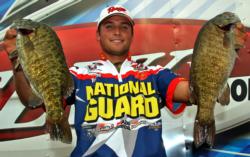 “Being a co-angler not only helps you learn how to fish but it also gives you confidence,” Lucas said. “After watching those pros fish and being on their boat, you know when you’re good enough. Being a co-angler gave me the confidence to think, `Hey, I can keep up with these guys.'”
“Being a co-angler not only helps you learn how to fish but it also gives you confidence,” Lucas said. “After watching those pros fish and being on their boat, you know when you’re good enough. Being a co-angler gave me the confidence to think, `Hey, I can keep up with these guys.'”
For Martin, starting as a co-angler not only gave him confidence, but it also served as an initiation to the hard-traveling lifestyle of a career fisherman.
“For me, starting out as a co-angler was the right move because it allowed me to get used to traveling around and seeing strange bodies of water without having the big investment of being a pro,” he said. “I felt like seeing those different bodies of water and seeing how people were catching fish made me comfortable after the first year to say to myself, `I might be able to do this.’ Lake fishing, smallmouth fishing, river fishing, clear-water fishing, shallow-water fishing – in one whole year I was able to experience all of those.”
Camaraderie and partnerships
Some co-anglers, like Divis, prefer to keep their distance from other co-anglers because it can be awkward to fraternize with the competition. Therefore, pro/co-angler partnerships, usually created in order to reduce travel costs and secure practice partners, are rather common. A couple of the more well-known partnerships are between Hunter and Ehrler and Lee and Mann. Often, these pairings work well because it allows the pro and co-angler to establish a mutually beneficial relationship based on trust.
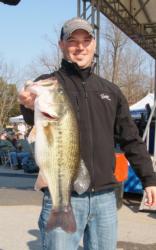 “Brent and I have become such really good friends that he trusts me and I trust him,” Hunter said. “He really trusts me not to run out to other guys and tell them what he’s doing, and he helps me get a feel for what the fish are going to be biting on, and this and that.”
“Brent and I have become such really good friends that he trusts me and I trust him,” Hunter said. “He really trusts me not to run out to other guys and tell them what he’s doing, and he helps me get a feel for what the fish are going to be biting on, and this and that.”
Ehrler and Hunter also room together on the road, reducing practice-scheduling stress and giving the pair even more time to talk fishing. In fact, his partnership with Ehrler played a factor in Hunter’s decision to remain a co-angler for now despite his pro aspirations.
“I get told all the time that there are so many co-anglers who would love to get in a boat and spend the day with him, and I hate to give up that spot,” Hunter said. “I want to ride that as long as I can. He doesn’t mind me learning from him. He knows in the future we may be fishing against each other, but hopefully we can keep rooming together and sharing information.”
For Lee and Mann, it is a fishing partnership that originally began on the golf course.
“It became natural for us to play golf and then fish before the tournament,” Lee said. “I don’t know that I’ve been able to help him that much, but I’ve learned a lot from Tom. Just seeing the water with him makes a big, big difference on my performance the first day of a tournament.”
Like Ehrler and Hunter, Lee and Mann have developed a trust over the years that is crucial in the competitive sport of bass fishing.
“You don’t ask questions to the pro you’re fishing with, because they’re doing their business,” Lee said. “But I can call Tom 15 hours out of the day, 365 days a year, for different recommendations and things to do. Having a good friend and roommate to travel with makes all the difference in the world, because you have somebody you can ask and know you’re going to get it straight. I know Tom will tell me right every time.”
Co-anglers can and will learn from any pro they are paired with, but having a trusted friend to learn from can translate into dollars when it comes to tournament earnings.
“I’ve spent probably 150 days in the boat with Tom over the last 15 years, if not more than that,” Lee said. “With these guys and their knowledge, it’s like getting the CliffsNotes, because they’ve spent all that time gleaning that knowledge, and you pick it up just by being around them. You learn in 150 days what they’ve learned in 30 years.”
Earning money
No one enters a bass tournament as a co-angler expecting to get rich. But with an eagerness to learn, a lot of perseverance and a little luck, some decent money can be made out of the back of the boat. As Divis said of his $228,000 career earnings, “That’s not pocket change.”
“I think if a guy’s got the time and he’s got a job where they will let him take off, then you can have a nice career as a co-angler,” Hunter said. “The money’s not there like it is in the front of the boat, but if you can get lucky and win a tournament, that payday is better than a lot of people make in a year’s time.”
For Martin, the easiest way to the check line is to train your mind to be relaxed on the water.
“I’ve noticed that anytime I get a co-angler who’s fishing really aggressively and who is really tense and uptight, they seem not to catch them as well,” he said. “Be open-minded, learn and have a good time. Do that, and you’ll make some money.”
As Divis warns, though, a co-angler who’s in it for the paycheck is a co-angler with the wrong motives.
“A co-angler doesn’t need to go into this thinking about how much money he’s going to make, because those co-anglers are going to fail,” Divis said. “You have to go into it as a learning experience.”
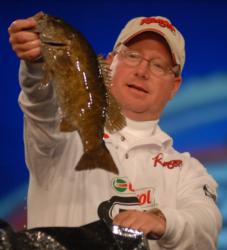 As a learning experience and as a fun way to spend your leisure time, the FLW co-angler experience is a bargain.
As a learning experience and as a fun way to spend your leisure time, the FLW co-angler experience is a bargain.
“I don’t know if you’d call it a career, but you can have something you really enjoy doing,” Lee said of his co-angling experience. “All these years, when I left the Cup in August, I could not wait until the season started again. I have a great part of my life really enhanced because of the co-angler opportunities on the FLW Tour.”
Co-angler opportunities abound for upcoming season
“What an exciting season we’re going to have,” Divis said of 2011. “We’re going to fabulous lakes and hitting them at the right time.”
Indeed, there seems to be no better time than the present to sign up as a co-angler.
“Do it,” Lee says. “Absolutely do it. If you love to bass fish, and you want to learn, and you’d like to see the different lakes and even have an opportunity to take home a little spending money or maybe get a paid vacation, definitely call FLW Outdoors and sign up. If fishing’s what you love and you have the opportunity, then you need to do it.”
“Think about the opportunity of fishing with Scott Martin for one day, and Luke Clausen one day, and Guido Hibdon the next day,” Divis said. “You can’t put a price on that. That’s the great thing about the co-angler side of the FLW Tour.”
(Editor’s note: For those interested in fishing as a co-angler on any FLW Outdoors tournament trail, contact FLW Outdoors headquarters at (270) 252-1000 or click here.